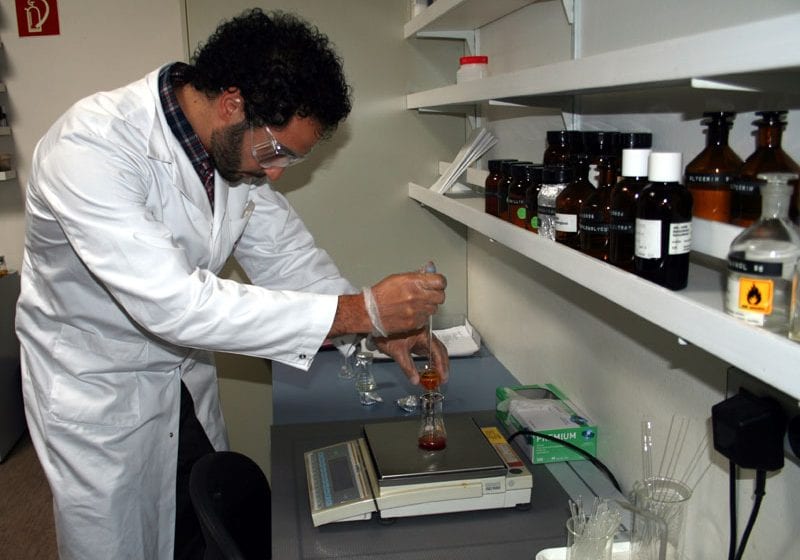A proposed ban on the sale of flavored tobacco products in the city of San Francisco, US, has been portrayed as a fight between pro-ban David and anti-ban Goliath, but the allegory doesn’t work because David isn’t the good, little guy he’s made out to be.
In a piece for the Competitive Enterprise Institute, Michelle Minton wrote on Friday that ‘big tobacco’ was pouring millions into a campaign to maintain its ability to keep selling harmful products that target children. ‘At least, that’s the narrative most news outlets have sold about Proposition E, a measure on the city’s June 5th ballot, which would ban the sale of flavors, including menthol, for tobacco products, including e-cigarettes,’ she added as clarification.
‘The David and Goliath story is compelling, but don’t be fooled. The other side, comprised of hundreds of anti-tobacco activists, is just – if not more – powerful than big tobacco companies. These groups have an advantage by cloaking their support of Prop E under the guise of “public health” and the support of factions in government and the university system, along with the industries that compete with e-cigarettes (e.g. big pharma). They also have vast financial resources, including taxpayer money, which they can spend without reporting it as “lobbying”.’
Minton goes on to describe the amounts and types of funding behind this lobbying and ‘non-lobbying’.
And she looks at the situation as it is currently, concluding, in part, that ‘kids, it seems, are neither targeted nor very interested in vaping, despite what anti-vaping activists claim’.
‘However, adult smokers increasingly rely on these devices as a safer means of consuming nicotine.
‘While likely not risk-free, recent analyses estimate that vaping has just one percent of the cancer risk that traditional combustible cigarettes carry.
‘And flavor seems to be an essential element in keeping people from returning to cigarettes. As a 2013 study found, the number of flavors a vaper used was independently associated with smoking cessation.’
Tag: United States

Flavors vote tomorrow

Aiming to be tobacco-free
World No Tobacco Day provided an opportunity to ‘remind ourselves of the epidemic of disease and death that the tobacco industry continues to cause,’ according to Action on Smoking and Health (ASH), which describes itself as ‘America’s oldest anti-tobacco organization’.
In a statement issued yesterday, on the eve of World No Tobacco Day, ASH said the vision of a world without tobacco deaths was purely aspirational to many; few could truly foresee a world without tobacco products commercially sold.
‘While we celebrate progress in reducing the carnage, we always ask ourselves “how many pointless, preventable deaths are acceptable?”,’ it said. ‘The answer must be zero.
‘Some may see this as extreme or naïve. Smoking has been around for centuries, and there are over a billion tobacco consumers around the world. In spite of over 50 years of fighting the tobacco industry, there are more smokers than ever. But this argument misidentifies the problem. We are not fighting smokers – they are the victims, not the perpetrators of this health catastrophe…
‘All the responsibility and guilt lays with the tobacco industry, which continues to aggressively market a product that has been specifically engineered to be as addictive as possible and that they know will kill when used as intended. As the Danish Institute for Human Rights put it, “there can be no doubt that the production and marketing of tobacco is irreconcilable with the human right to health”.
‘The world is starting to wake up. If a new product came on the market tomorrow that was addictive and deadly, there is no doubt that swift action would be taken, including holding those responsible legally liable. We have had a blind spot when it comes to tobacco, but this is changing. In March, the global health community adopted the Cape Town Declaration on Human Rights and a Tobacco-Free World, recognizing that the tobacco industry infringes on human rights. Over 150 organizations – and counting – have endorsed the Declaration.
‘There will come a May 31st we can celebrate being truly tobacco-free. ASH aims to bring that day as soon as possible, saving as many loved ones as possible.’
Flavors defended
The introduction to the city council of Chicago, US, of a measure aimed at banning flavored nicotine cartridges used with electronic cigarettes has been condemned by experts at the free-market think tank, The Heartland Institute.
The measure has been put forward by Alderman Ed Burke.
‘Alderman Ed Burke’s proposed ordinance is nothing more than preening for moralizing anti-fun busybodies,’ said Jesse Hathaway, research fellow, budget and tax policy at the institute.
‘Selling e-cigarettes to individuals under the age of 18 is already illegal in Illinois, so the ordinance’s aims are already addressed by existing laws.
‘Prohibiting the sale of flavored vaping products won’t save any lives, but it may stop people currently addicted to cigarettes from switching to less-harmful alternatives or even kicking the nicotine habit.
‘If Burke’s goal is to promote public health, restricting access to flavoring in e-cigarettes advances the ball in the wrong direction.
‘If Burke’s goal is to look like he’s doing something to gain accolades from the puritan anti-e-cig crowd without actually doing anything useful, then this is perfect.’
Meanwhile, Lindsey Stroud, state government relations manager at the institute, said the role of flavors in electronic cigarettes and vaping devices was crucial – and a motivating factor that had enabled thousands of smokers to quit combustible cigarettes, according to 72 percent of the respondents to a 2015 Consumer Advocates for Smoke-free Alternatives study of 19,000 observations.
‘While attempting to “protect the children,” Alderman Burke ignores the role of tobacco harm reduction (THR) products for adults and is attempting to limit the choices available to help alleviate these individuals from cigarette addiction,’ said Stroud.
‘Rather than placing restrictions on products that have been proven to aid individuals who desire to quit smoking, policy makers should promote the unencumbered use of THR products.’
Machinery sale scheduled
The US-based Iron Horse Auction Company is to auction tobacco machinery and related manufacturing and office equipment in June.
The company, which is in Rockingham, North Carolina, said that it had been ordered by the United States Bankruptcy Court for the Middle District of North Carolina to sell late model and rebuild cigarette manufacturing equipment owned by North Carolina Tobacco International, LLC.
It said the auction would feature Decoulflé rod makers, Decoulflé tipping units, Hauni tray fillers and supporting equipment.
The auction is due to take place on line from June 7 to June 14.
The items for auction can be viewed at:
https://www.ironhorseauction.info/auction/bankruptcy-auction-of-north-carolina-tobacco-international-llc-128.
AOI to present results
Alliance One International said yesterday that it would hold a conference call from 08.00 Eastern Time on June 7 to report financial results for its fourth quarter and fiscal year ended March 31.
The dial-in numbers for the conference call are (877) 260-1479 for domestic callers and (334) 323-0522 for those calling from outside the US. The conference ID is 8903737.
The live call may be accessed also on the Alliance One website by registering at www.aointl.com 15 minutes in advance.
A replay of the conference call will be available also from 11.00 on June 7 through 11.00 on June 12 by dialing (888) 203-1112 (US) or (719) 457-0820 (outside the US), using the code 8903737.
Meanwhile, the company said yesterday that it would hold an investor day on September 12 in New York City.
‘The Investor and Analyst Day will provide insight into the company’s operations, strategic goals, and commitment to shareholder value as well as offer networking opportunities with AOI’s leadership team,’ the company said in a note posted on its website.
‘A more detailed agenda for the Investor and Analyst Day will be provided at a later date. ‘Analysts and institutional investors interested in attending are encouraged to contact jbailey@aointl.com.
‘A live webcast of the Investor and Analyst Day presentation will be available in the investor relations section of the company’s website, www.aointl.com.’
Universal presents results
If the global leaf market remained stable, Universal Corporation expected to achieve higher total sales volumes for fiscal year 2019, said chairman, president and CEO George C. Freeman, III, in announcing the company’s annual results.
“The next crop cycle, which will be reflected in our fiscal year 2019 results, has begun with green tobacco purchases in Brazil,” said Freeman. “Farmer deliveries there are a little slower this year, but the crop quality is very good. We are also seeing the recovery of African Burley production volumes and improved North American shipments…”
Freeman reported net income for the fiscal year ended March 31 of $105.7 million, or $4.14 per diluted share, compared with $106.3 million, or $0.88 per diluted share for the same period of the prior fiscal year. Excluding one-off items, diluted earnings per share for fiscal year 2018 of $3.96 decreased by $0.01 from that of the same period of the previous year.
‘Operating income of $171.5 million for the year ended March 31, 2018, decreased by $6.9 million compared to the year ended March 31, 2017, the report said.
‘Segment operating income was $180.6 million for the year ended March 31, 2018, a decrease of $7.9 million, compared to the year ended March 31, 2017, as improved results in our Other Regions and Other Tobacco Operations segments were offset by declines in our North America segment.
‘Revenues of $2.0 billion for fiscal year 2018 were down only 1.8 percent compared to fiscal year 2017, as lower volumes, primarily in Africa, were largely offset by higher sales prices and processing revenues.’
Nicotine policy flawed
In a sun-sentinel.com opinion piece, Raymond March has asked why, when other examples of lawmakers attempting to legislate consumer health have failed or made the situation worse, would it be assumed that regulating cigarettes would be any different?
March said that, in 2015, nearly 70 percent of smokers in the US tried unsuccessfully to quit and that their inability to stop had come with considerable health risks. According to the Centers for Disease Control and Prevention, smoking accounted for more than 480,000 preventable deaths per year. Health complications associated with smoking were also financially taxing, leading to nearly $170 billion in direct medical costs annually.
To reduce both eye-opening figures, the Food and Drug Administration had recently announced its intent to reduce nicotine levels in cigarettes.
The FDA hoped that reducing nicotine would cause current smokers to cut back and prevent future generations from starting.
But, said March, it was important to look beyond policy intentions. Unfortunately, the most well-intended policies, especially those aimed to promote health or deter vices, were often deceptively harmful.
Reducing nicotine in cigarettes would likely motivate smokers to consume more cigarettes to satisfy their craving, increasing the amount of toxic materials they ingested. Others might turn to other nicotine products to satisfy their cravings.
Often the alternatives were no better or worse.
Regulations placed on physicians and consumers to prevent opioid abuse often drove patients to seek dangerous illicit alternatives, including heroin. Taxing soda motivated consumers to drink more unhealthy fruit juices and alcoholic beverages. As a result, the consumer’s health was at greater risk.
‘When other examples of lawmakers attempting to legislate consumer health fail or make the situation worse, why would regulating cigarettes be any different?’ he asked.
March is a research fellow at the Independent Institute and assistant professor of economics at San Jose State University.
Altria Group restructures
The Altria Group yesterday announced a new structure ‘to maximize its core tobacco businesses while realizing its aspiration to be the US leader in authorized, non-combustible, reduced-risk products’.
In a note posted on its website, Altria said that the key components of the new structure included:- Establishing two divisions – core tobacco and innovative tobacco products;
- Creating a chief growth officer function to accelerate speed to market for innovative products and technologies; and
- Aligning product development efforts more directly to the core and innovative tobacco product businesses.
“This is a dynamic time in the tobacco industry, and just as we lead in traditional tobacco products, we intend to lead in offering adult smokers more choices in innovative, non-combustible, reduced-risk products,” said Howard Willard, Altria’s chairman and CEO.
“We expect this new structure to accelerate our innovation pipeline, maximize our core tobacco businesses and allow us to continue to reward shareholders.”
Altria said it would adapt its structure from one where a chief operating officer oversaw all operating companies to a structure aligned with the company’s dual strategies – maximizing income from core tobacco businesses and growing new income with innovative tobacco products.
PM USA, USSTC, Middleton, and Nat Sherman will form Altria’s core tobacco division.
‘Jody Begley, as senior vice president, tobacco products, Altria, will oversee the core tobacco businesses, as well as their product development and engineering support,’ the note. ‘He will report to Billy Gifford, vice chairman and CFO.’
Leading those businesses will be:- Heather Newman, president and CEO, PM USA;
- Shannon Leistra, president and CEO, USSTC;
- Ryan Bauersachs, MD and general manager, Middleton; and
- Dominik Meier, MD and general manager, Nat Sherman.
Meanwhile, Altria said that its innovation company, Nu Mark, would focus on developing a compelling portfolio of non-combustible products that adult smokers enjoyed and that had the potential to drive adult smoker conversion. ‘This portfolio includes oral nicotine-containing products, e-vapor and innovative inhalable products,’ the note said.
‘Brian Quigley, as president and CEO, Nu Mark, will oversee the innovative products business, reporting to Howard Willard.’
At the same time, Altria said it had established a chief growth officer function that would ‘identify and pursue Altria’s strategic and innovative growth priorities across the tobacco landscape’. ‘This function will identify marketplace and adult tobacco consumer insights and translate them into strategies for product development, consumer engagement, future of commerce and business development,’ it said.
‘K.C. Crosthwaite is appointed senior vice president and chief growth officer, Altria Client Services LLC (ALCS), reporting to Howard Willard.’
The changes are due to go into effect on June 1.
E-cigs struggling in US
While the number of people in the US who tried electronic cigarettes increased between 2014 and 2016, the number of people who used these products fell, according to a story by Tom Snee, of the University of Iowa, citing the results of a new study.
In the story, posted on the futurity.org website, Snee said that researchers had analyzed national data from more than 101,000 people in the US who had participated in the annual National Health Interview Survey (NHIS) by the US Centers for Disease Control and Prevention.
‘Since 2014, the NHIS has asked adult participants whether they currently use e-cigarettes every day, some days, or not at all,’ he said.
‘The findings, which appear in the Journal of the American Medical Association, show that the number of adults who tried e-cigarettes increased – from 12.6 percent in 2014 to 13.9 percent in 2015 and 15.3 percent in 2016.
‘However, during the same time period, the number of people who said they currently use e-cigarettes “every day” or “some days” decreased – from 3.7 percent in 2014 to 3.5 percent in 2015 to 3.2 percent in 2016.
Expanding cannabis
Alliance One International said yesterday that its indirect subsidiary, Canada’s Island Garden (CIG), would undergo a ‘significant expansion’ to support the growth of its Canadian cannabis line.
The expansion, involving the construction of state-of-the-art plant, would increase CIG’s production capacity of medicinal cannabis, Alliance said. And it would increase production capacity for recreational cannabis as and when sales for the recreational market were legalized.
‘Phase 1 of the expansion, which includes a 166,000-square-foot greenhouse and 54,000-square-foot warehouse, is a $27 million (C$35M) investment,’ it said. ‘The warehouse is being constructed to also accommodate Phase 2 of the expansion, which would add an additional 90,000 square feet of greenhouse space.
‘Phase 1 will increase the facility’s annual production capacity from 1,200 kg to 18,000 kg and is expected to be complete in spring 2019. ‘Assuming completion of Phase 2, Canada’s Island Garden would have a total annual production capacity in excess of 35,000 kg.
‘Both the Phase 1 and Phase 2 expansions are designed to feature the latest technological advancements in horticulture and cannabis production to allow for the production of a premium-quality and sustainable product for consumers in Canada, optimized to create comprehensive transparency and traceability, from plant to final product, while also including security protections to maintain proper control of the facility.’
Meanwhile, Alliance said that CIG had unveiled a new ‘FIGR’ brand, which reflected ‘the scientific rigor and decades of agronomic excellence for which it is known’.
‘Since the acquisition of 75 percent of Canada’s Island Garden by Canadian Cultivated Products, a wholly owned indirect subsidiary of Alliance One, the Canadian companies have been working on a new naming and branding concept. Canadian Cultivated Products will be rebranded to FIGR Cannabis, Canada’s Island Garden to FIGR East and Goldleaf Pharm, a sister company in Simcoe, Ontario, to FIGR Norfolk.
‘FIGR products are intended become available to the public in Canada as soon as sales in the recreational adult market are legalized. Sales to medical patients in Canada will remain under the current branding of Canada’s Island Garden.’










